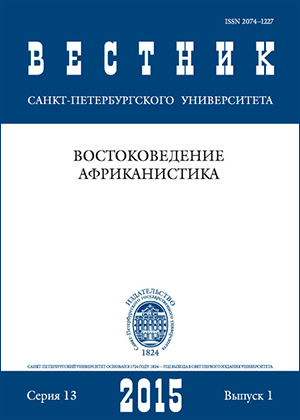Short short stories in the creative activity of contemporary Japanese writers Akagawa Jirō and Atōda Takashi
Abstract
This paper explores the extra-short Japanese story, which has a special name, “shōto shōto” (from English “short short”), with regard to different types of wordplay as its major artistic device, which originated in several minor genre forms in Ancient and Medieval Japanese literature. Basing on works of two the most popular “short short story” Japanese writers — Akagawa Jirō and Atōda Takashi — I analyze wordplay as one of the main characteristic features of the extra-short story in the Japanese literature of the last three decades. I examine how wordplay in contemporary Japanese extra-short stories is building the plot: it may be a play of consonances, various kinds of homonyms (homophones especially), similar hieroglyphic characters, loanwords, etc. The wrong interpretation of something said, seen or written, often against the background of expected punishment for the evil done, making the basis of some short stories by Akagawa, always has a psychological root cause: the man sees and hears only what he or she wants and, vice versa what he or she is frantically afraid of seeing and hearing, often paying for the lack of attention with his own destroyed destiny. Like with Akagawa a number of Atōda’s stories are built on wordplay, on the wrong interpretation of something heard, said or written, which, as distinguished from analogous stories by Akagawa, more often brings the hero to a comical rather than a tragic ending; these stories give a very convincing portrait of the characters and their psychology. Refs 25.
Keywords:
Akagawa Jirō, Atōda Takashi, wordplay, extra-short story, shōto shōto
Downloads
References
Downloads
Published
How to Cite
Issue
Section
License
Articles of "Vestnik of Saint Petersburg University. Asian and African Studies" are open access distributed under the terms of the License Agreement with Saint Petersburg State University, which permits to the authors unrestricted distribution and self-archiving free of charge.





